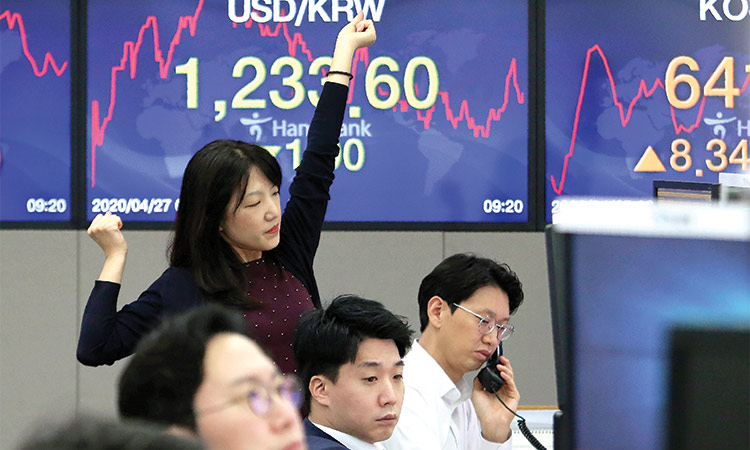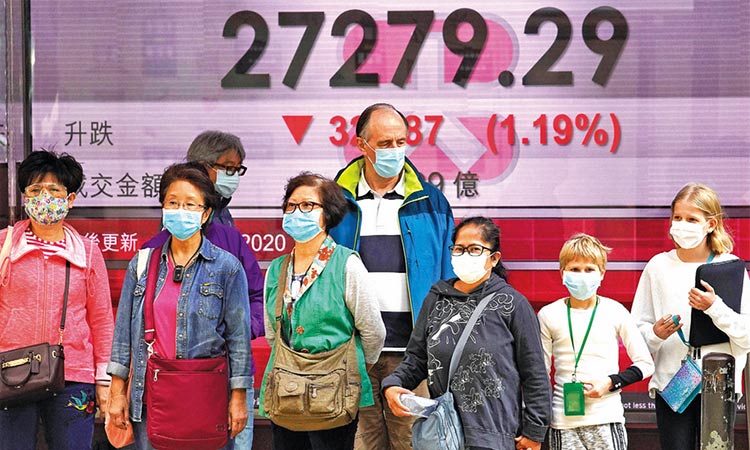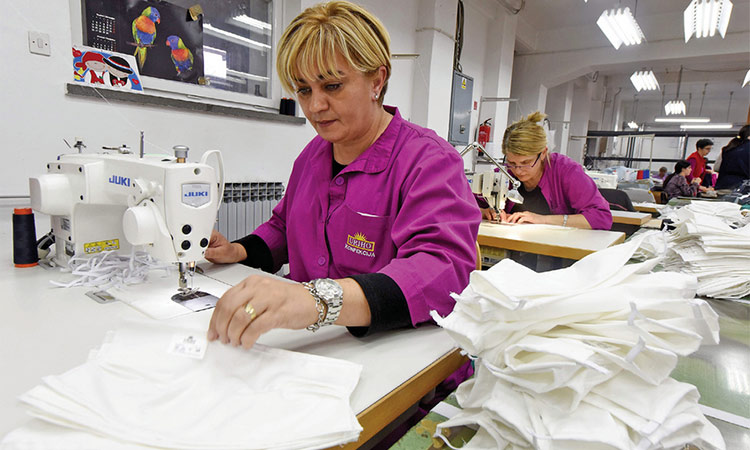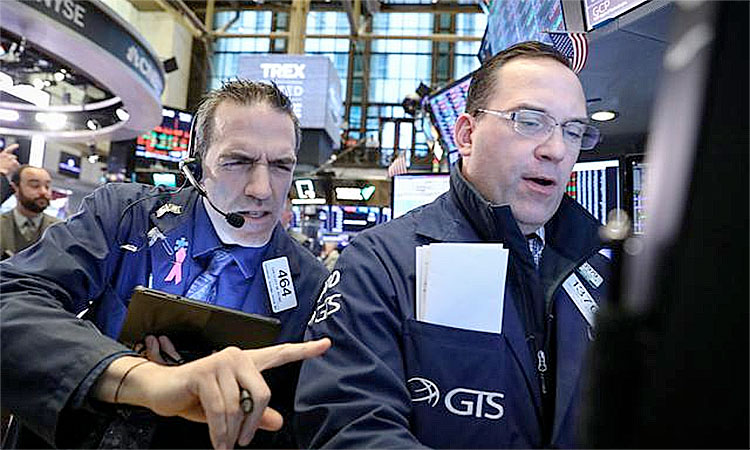Global stock markets rise on lockdown easing hopes; oil drops

A currency trader stretches at the foreign exchange dealing room of the KEB Hana Bank headquarters in Seoul on Monday. Associated Press
The US dollar fell as risk-prone traders cheered lockdown news even as health experts warned that not enough coronavirus testing was in place in the United States. From Italy to New Zealand, governments announced the easing of restrictions, while Britain said it was too early to relax them there.
The Bank of Japan kicked off a week of central bank meetings by pledging to buy unlimited amounts of government bonds, continuing a trend of historic stimulus announcements to offset the economic effects of the COVID-19 pandemic.
The US Federal Reserve and the European Central Bank meet later in the week, with the ECB expected to increase the size of its bond buying programme.
“It’s central bank week and investor sentiment is on a firm footing,” said Stephen Gallo, European head of FX strategy at BMO Capital Markets.
“This is purely a case of ‘don’t fight the central banks,’” he said. The Dow Jones Industrial Average rose 161.53 points, or 0.68%, to 23,936.8, the S&P 500 gained 26.11 points, or 0.92%, to 2,862.85 and the Nasdaq Composite added 108.28 points, or 1.25%, to 8,742.80.
The pan-European STOXX 600 index rose 1.29% and MSCI’s gauge of stocks across the globe gained 1.28%.
After more than a month of lockdowns, some countries and US states are gradually moving to ease restrictions that have in some cases proven effective, believing the peak of the virus infection rate has passed.
Although trillions of dollars in stimulus have helped the S&P 500 recover nearly 30% from its March lows, some analysts say more gains may be capped as the economic damage grows, unless there is progress on treatments for the disease.
“There are so many things that can go wrong in the next six months,” said Marc Chaikin, founder of Chaikin Analytics in Philadelphia, adding that “history suggests that bear markets end with a whimper and not a bang.” Emerging market stocks rose 1.78%. MSCI’s broadest index of Asia-Pacific shares outside Japan closed 1.88% higher, while Japan’s Nikkei rose 2.71%.
In a busy week for US corporate earnings, Apple, Amazon, Facebook, Microsoft, Caterpillar, Ford, General Electric and Chevron are expected to report.
Analysts expect a 15% decline in S&P 500 first-quarter earnings, with profits for the energy sector estimated to have slumped more than 60%, raising fears of debt defaults.
Oil prices weakened sharply on continued concern about oversupply and a lack of storage space. The front-month contract was trading at lower-than-usual volumes as traders moved to later months in futures’ contracts.
“The market is very concerned about a repeat of negative pricing as the Cushing storage and delivery hub saturates,” Harry Tchilinguirian, global oil strategist at BNP Paribas in London, told the Reuters Global Oil Forum.
“The shift of open interest away from June will have negative consequences for the liquidity of the contract, potentially leading to greater volatility in its price,” he said.
US crude fell 27.45% to $12.29 per barrel and Brent was at $19.57, down 8.72% on the day.
The US dollar dropped as the broader upbeat mood encouraged investors to move into other currencies.
The dollar index fell 0.2%, with the euro up 0.18% to $1.0839.
The Japanese yen strengthened 0.27% versus the greenback at 107.29 per dollar, while Sterling was last trading at $1.2408, up 0.33% on the day.
US Treasury yields rose, with the benchmark 10-year note last down 15/32 in price to yield 0.6415%, from 0.596% late on Friday.
The 2-year note last fell 2/32 in price to yield 0.2406%, from 0.216%. Spot gold dropped 1.0% to $1,709.73 an ounce. The United States and European Union both release first-quarter economic growth numbers this week, while the influential US ISM manufacturing survey is also due.
Meanwhile, gold slipped on Monday as signs that countries may soon ease coronavirus-driven lockdowns lifted risk sentiment, although its losses were limited by expectations of more stimulus measures from major central banks.
Spot Gold was down 0.6% at $1,716.77 per ounce by 1237 GMT. US Gold futures were steady at $1,736.20 an ounce.
“We are starting to see a lot more talk about economies reopening and trying to get business back to normal as much as possible and that does seem to be lifting sentiment. This kind of bounce in risk appetite is potentially fuelling profit taking in Gold,” OANDA analyst Craig Erlam said.
“Even when the lockdown is lifted, the world will still be far from any kind of normality. The bigger risk then is economic collapse,” Commerzbank analysts wrote in a note. “To counter this, governments around the globe are likely to continue spending unparalleled sums of money - most of which will be created by the central banks. Gold should remain in demand as a crisis currency in this environment, as reflected in ongoing exchange-traded fund (ETF) inflows.”
Agencies







